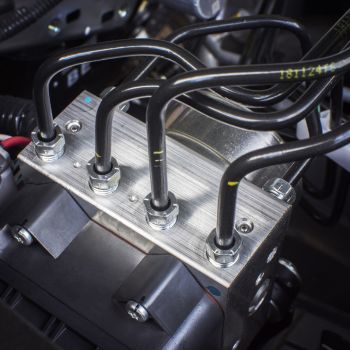 In the 1960s, automakers started introducing computer systems to monitor and adjust vehicle performance. Today, aspects like the engine control module (ECM), powertrain module (PCM) and transmission control module (TCM) analyze and oversee vehicle operation through a series of sensors and electrical components.
In the 1960s, automakers started introducing computer systems to monitor and adjust vehicle performance. Today, aspects like the engine control module (ECM), powertrain module (PCM) and transmission control module (TCM) analyze and oversee vehicle operation through a series of sensors and electrical components.
Overall, these factors make your vehicle more efficient. Yet corrosion, wear and other damage can influence how the computer systems operate and take readings.
How Car Computer Systems Operate
For drivers, the shift to computer systems decreased the need to see a mechanic for tune-ups to maintain performance. Instead, regularly scheduled maintenance is often enough. Today, the ECM performs two key roles within your vehicle.
First, it acts as a central processor, analyzing signals from sensors across your car’s systems. Second, it responds to these messages by constantly making various small but essential adjustments that ensure peak operation. The data is then sent to or combined with signals from sub-computer systems like the PCM and TCM, which primarily oversee your car’s brakes and shifting.
Unfortunately, wear and tear, weather exposure and damage can affect the sensors throughout your car and its electrical system. This development ultimately means that the ECM receives less accurate information and bases its adjustments on this data. Common scenarios affecting the performance of the ECM, PCM and RCM include:
- Short circuiting, voltage spikes and electrical issues
- Corrosion from excess moisture
- Excessive vibrations affecting the connections between circuits
- Temperature changes causing the computer and electrical systems to overheat
Issues From a Damaged or Defective Car Computer
A damaged or defective ECM directly affects your car’s performance. Common issues and signs include:
- The check engine light comes on. While this light is a general sign of performance issues, it typically correlates with a defective sensor providing the ECM with inaccurate readings, as well as circuit and electrical issues.
- Your car won’t start. Although this often goes back to the ignition and combustion process, the ECM plays a role. Specifically, inaccurate readings may be throwing off the air-to-fuel ratio, affecting the timing belt or not gathering ignition data from the crankshaft or camshaft. As a result, your car won’t start at all, you need to restart it multiple times or it frequently stalls.
- Engine misfiring. Inaccurate readings can cause the ECM to alter the air-to-fuel ratio and other engine components influencing timing and operation. In this case, the engine starts up but regularly stalls, idles, misfires or struggles to help your car accelerate.
- Declining fuel economy. Changes in the air-to-fuel ratio can directly impact your car’s fuel economy. Specifically, an inaccurate reading from sensors can cause your vehicle to go through more fuel, resulting in fewer miles per gallon.
- Changes in acceleration. The ECM and TCM can get out of sync due to inaccurate sensor readings regarding the transmission system. In turn, the ECM can’t properly adjust the throttle, so the vehicle fails to efficiently accelerate, may decelerate as you’re driving or rides rough. Your engine may also feel like it accelerates quickly and without warning.
- Burning smell. You may notice this scent coming from the engine, which can indicate worn-out, overworked components from mixed signals sent by the ECM to the rest of your car, resulting in more strain and resistance on other systems.
Have the performance of your car’s computer systems examined and adjusted during regularly scheduled maintenance and comprehensive vehicle assessments. Contact us today to schedule an appointment today.




